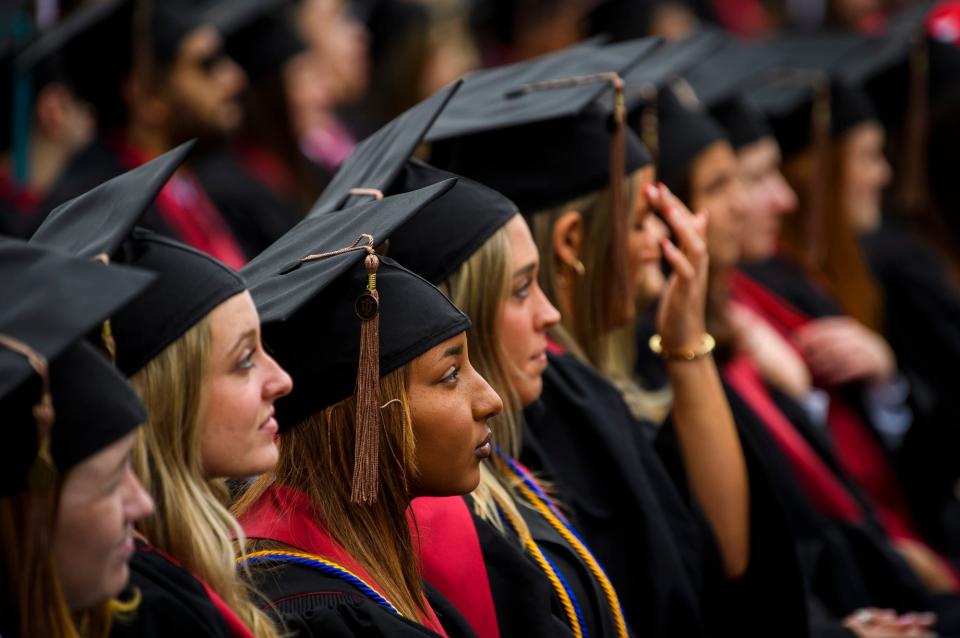Indiana University graduates have good job prospects now. That might not last.

After graduating from Indiana University, one of the first things Carrick Moon did was pull up Google and type into the search bar: how to get a job out of college.
In a fraction of a second, 6.7 billion answers appeared — news sites' "tips and tricks" listicles, universities' resume-building guides, business magazines' "What to expect" articles, strangers' viral social media threads.
"There's so much out there that you almost don't even know where to start," Moon said.
Labor struggle within IU: IU Board of Trustees says no to a student labor union, grad workers prepare for fall strike
Both economists and graduates note there's been a change in culture and power balance in the job search process. With a tight labor market, job seekers are using their new leverage to advocate for work and lifestyle changes. However, though job seekers are more empowered, economists advise starting a job search sooner rather than later.
Labor market shortage: Here's how it impacts job candidates
Though the COVID-19 pandemic isn't making as many headlines with viral outbreaks and business shut downs, it continues to have a lasting impact on the U.S. economy, leaving many local economists guessing about the near future.
For over three decades, Bill Witte, an IU associate professor emeritus of economics, has collaborated with the Kelley School of Business to prepare an annual business outlook forecast. For these projections, Witte leans on his own model, which uses past behavior of the U.S. economy, to predict national and local trends in the business and labor markets. However, he recently learned his model doesn't help much when it comes to predictions during unprecedented times.
"Right now, I'm really sort of still flying — maybe not completely blind — but
in a lot of ways, with a lot of uncertainty," Witte said.
More: Catalent workers to see 'disruptive' changes; about 200 temp jobs to be eliminated
In some ways, 2020's economic volatility was even worse than seen during the Great Depression because the events happened so fast, according to Witte.
"It all occurred in basically about a three- or four-week period. In March, we had this drop, which is really just like falling off a very high cliff, but then when we hit bottom, immediately, things started to get better dramatically," Witte said.
Indiana was able to recover faster than neighboring states due to its prevalent manufacturing industry, which rebounded fairly quickly after the shut downs. Service industries, such as work in restaurants and hotels, has taken much longer to recover.
The pandemic continues to impact the labor market. During the COVID-19 pandemic's height in 2020, many people retired early. Additionally, some households discovered they could live on a single income, which caused many people who lost their jobs to decide not to seek other employment.
"You've lost maybe a million and a half or 2 million people from the labor force," Witte said. "In any case, the number of people that are working in the U.S. is right now about 1% below what it was pre-pandemic."
Earlier coverage: Bloomington employers struggling to find workers: 'most brutal job market that I've seen'
Business across various industries — from the lumberyard to tech corporations — have increased wages. However, as noted by some experts, this reliable strategy doesn't seem to be working.
"The economists would say, if you want to bring people off the sidelines (and) into the game, you just pay more, but that doesn't seem to be working too well," said Timothy Slaper, co-director of the Kelley School's Indiana Business Research Center.
While it seems like people are getting paid more on paper, inflation has mitigated any significant benefit, Witte noted.
"Wages have gone up a lot, but wages haven't gone up as much as prices," Witte said. "While workers are getting paid more in dollars, they're getting paid less in terms of what those dollars buy."
Several companies have offered more incentives, such as sign-on bonuses, but even those haven't worked well.
The standard techniques of recruiting more people into the labor force have been ineffective, Slaper said. Instead, employers have to adjust to workers' lifestyle changes spurred by the pandemic.
"(Workers) want some more autonomy, more freedom to do kind of whatever they want to do — start early and then get on their bike at 3 in the afternoon," Slaper said.
As a recent college graduate, Moon said the job searching has become more democratized, with job candidates having more leverage.
"We have a new sense of autonomy and a new sense of empowerment as job seekers, to kind of stick up for ourselves and say, 'Hey, I deserve to be paid well. Why can't I have these benefits? Why can't I have this time off or work from home if I need to?'" Moon said.
From what Moon has witnessed, employers have reacted positively to the shift.
"I have yet to come across a job where I've been shocked by what they don't offer. Oftentimes, I've been really encouraged," Moon said.
Recent IU graduate offers job search advice
While some of his friends had jobs lined up right after graduation, Moon, like many IU graduates, started his job search in May after he walked across the commencement stage.
Moon graduated with a bachelor's degree in liberal studies and a minor in political science. He's only recently been applying for jobs after spending several weeks crafting his resume. He also made a guide for himself, making a list of the ideal companies he'd like to work at as well as near future professional goals. Moon is looking at four or five different industries that could match his experience and education.

"I think it's very important to kind of cast a wide net. You never know if the job you've got 25th on your list is actually the one that's going to have the team and the work that's best suited for you," Moon said.
As you cast a wide net, he noted it was also important to prioritize your goals — whether you want a high-paid position, an ideal location or self-satisfying work.
More: What's it like to graduate college before high school? These local teens can tell you
Though he doesn't plan to stay in Indiana, his ties to IU haven't completely severed since he's left campus. He's remained in touch with peers and faculty members, recently reaching out within his network for letters of recommendation.
"I was, in some ways, lucky to be very involved on campus. I have hundreds of mentors and peers that I can look to for inspiration and just for tips of the trade," Moon said.
IU expert warns of possible recession, 'shaky ground' for new grads
While many recent graduates might have the pick of the litter in their trade, they shouldn't wait to start their job search. While it seems like the U.S. economy is bouncing back, many economists remain wary.
According to Witte, an overreliance on increasing wages can hike up the inflation rate.
"Higher prices lead to higher wages, which lead to higher prices," Witte said, noting it's a "viscous cycle" that workers are caught in.
While Witte's current forecast is the labor market will continue to be tight with ample opportunities, he notes there could be a drastic change.
"I think there's a significant possibility that things could worsen," Witte said, referencing a potential recession, which historically impedes the labor market.
"I think the lesson there for college students coming out: Get the best job you can right now and really work to make sure that you can keep that job because for the next couple of years, you might be on shaky ground a little bit," Witte said.
Moon noted it's intimidating to first begin searching for jobs, which is why he recommends connecting with people who are in a similar position. Social media sites, such as LinkedIn, can give job seekers a window to see what's possible.
"I think it's really hard to kind of stare at that (success) and not want to get on the horse yourself," Moon said.
Contact Rachel Smith at rksmith@heraldt.com or @RachelSmithNews on Twitter.
This article originally appeared on The Herald-Times: IU graduates may have 'shaky ground' when job searching soon
